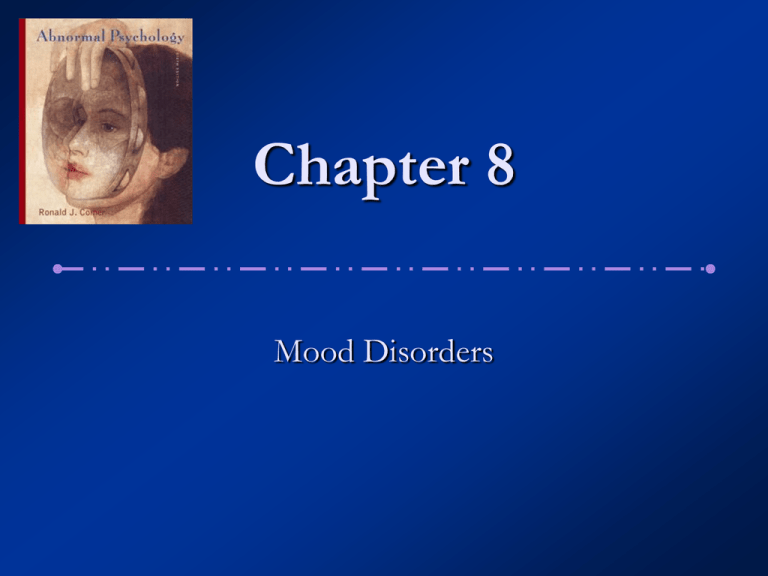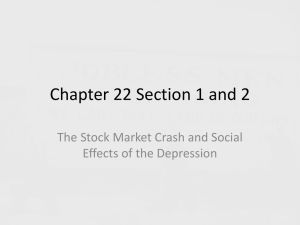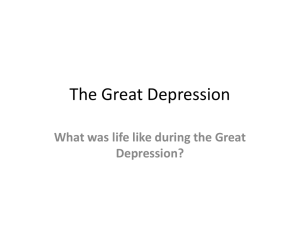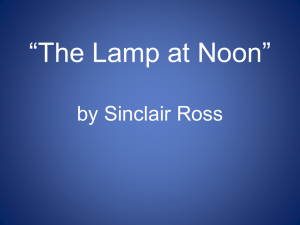
Chapter 8
Mood Disorders
Mood Disorders
Two key emotions on a continuum:
Depression
Depression
Mania
Low, sad state in which life seems dark and overwhelming
Mania
State of breathless euphoria and frenzied energy
Moods
Mania
Hypomania
N.Sad
Exhaltation
Extreme
Dysphoria
MDD
W/Mel
N
Manic
Psychosis
Euphoria
Blues
Major
Dep.
Psyc.
Note: psychosis (gross distortions of reality) can occur at either end of the continuum.
Not all major dep. or manic episodes necessarily result in psychosis.
Mood Disorders
Most people with a mood disorder experience only
depression
Person has no history of mania
Mood returns to normal when depression lifts
Some people experience periods of depression that
alternate with periods of mania
This pattern is called unipolar depression
This pattern is called bipolar disorder
One might logically expect a third pattern – unipolar
mania, in which people suffer from mania only – but this
pattern is uncommon
Mood Disorders
These disorders have always captured people’s
interest
Millions of people have mood disorders
Economic costs of mood disorders amount to more
than $80 billion each year
Human suffering is incalculable
Unipolar Depression
The term “depression” is often used to describe
general sadness or unhappiness
This usage confuses a normal mood swing with a
clinical syndrome
Clinical depression can bring severe and longlasting psychological pain that may intensify over
time
How Common Is Unipolar
Depression?
About 7% of the U.S. population experiences
severe unipolar depression in any given year
As many as 5% experience mild depression
The prevalence is similar in Canada, England,
France, and many other countries
Approximately 17% of all adults experience
unipolar depression at some time in their lives
Rates have been steadily increasing since 1915
How Common Is Unipolar
Depression?
In almost all countries, women are twice as likely as
men to experience severe unipolar depression
Lifetime prevalence: 26% of women vs. 12% of men
These rates hold true across socioeconomic classes and
ethnic groups
Approximately 50% recover within six weeks, some
without treatment
Most will experience another episode at some point
What Are the Symptoms of
Depression?
Symptoms may differ dramatically from person to
person
Five main areas of functioning may be affected:
1.
Emotional symptoms
Feeling “miserable,” “empty,” “humiliated”
Experiencing little pleasure
2.
Motivational symptoms
Lacking drive, initiative, spontaneity
Between 6% and 15% of those with severe depression commit suicide
What Are the Symptoms of
Unipolar Depression?
Five main areas of functioning may be affected:
3.
Behavioral symptoms
Less active, less productive
4.
Cognitive symptoms
Hold negative views of themselves
Blame themselves for unfortunate events
Pessimism
5.
Physical symptoms
Headaches, dizzy spells, general pain
Diagnosing Unipolar Depression
Criteria 1: Major depressive episode
Marked by five or more symptoms lasting two or
more weeks
In extreme cases, symptoms are psychotic, including
Hallucinations
Delusions
Criteria 2: No history of mania
Diagnosing Unipolar Depression
Two diagnoses to consider:
Major depressive disorder
Criteria 1 and 2 are met
Dysthymic disorder
Symptoms are “mild but chronic”
Depression is longer lasting but less disabling
Consistent symptoms for at least two years
When dysthymic disorder leads to major depressive disorder,
the sequence is called “double depression”
What Causes Unipolar
Depression?
Stress may be a trigger for depression
People with depression experience a greater number
of stressful life events during the month just prior to
the onset of their symptoms
Some clinicians distinguish reactive (exogenous)
depression from endogenous depression, which
seems to be a response to internal factors
The utility of this distinction is questionable and today’s
clinicians usually concentrate on recognizing the
situational and the internal aspects of any given case
What Causes Unipolar Depression?
The Biological View
Genetic factors
Family pedigree, twin, adoption, and molecular gene studies
suggest that some people inherit a biological predisposition
Researchers have found that as many as 20% of relatives of those with
depression are themselves depressed, compared with fewer than 10% of
the general population
Twin studies demonstrate a strong genetic component:
Rates for identical (MZ) twins = 46%
Rates for fraternal (DZ) twins = 20%
Adoption and molecular gene studies also have implicated a genetic factor
in cases of severe unipolar depression
What Causes Unipolar Depression?
The Biological View
Biochemical factors
NTs: serotonin and norepinephrine
In the 1950s, medications for high blood pressure were found
to cause depression
Some lowered serotonin, others lowered norepinephrine
This led to the “discovery” of effective antidepressant
medications which relieved depression by increasing either
serotonin or norepinephrine
Depression likely involves not just serotonin nor
norepinephrine… a complex interaction is at work, and other
NTs may be involved
What Causes Unipolar Depression?
The Biological View
Biochemical factors
Endocrine system / hormone release
People with depression have been found to have
abnormal levels of cortisol
People with depression have been found to have
abnormal melatonin secretion
Released by the adrenal glands during times of stress
“Dracula hormone”
Other researchers are investigating whether deficiencies
of important proteins within neurons are tied to
depression
What Causes Unipolar Depression?
The Biological View
Biochemical factors
Model has produced enthusiasm but has significant
limitations:
Relies on analogue studies: depression-like symptoms
created in lab animals
Do these symptoms correlate with human emotions?
Measuring brain activity has been difficult
Current studies using modern technology are attempting to
address this issue
What Causes Unipolar Depression?
The Psychological Views
Three main models:
Psychodynamic model
Behavioral model
Not strongly supported by research
Modestly supported by research
Cognitive model
Has considerable research support
What Causes Unipolar Depression?
The Psychological Views
Psychodynamic view
Link between depression and grief
When a loved one dies, the mourner regresses to the oral stage
For most people, grief is temporary
If grief is severe and long-lasting, depression results
Those with oral stage issues (unmet or excessively met needs) are
at greater risk for developing depression
Some people experience “symbolic” (not actual) loss
Newer psychoanalysts focus on relationships with others (object
relations theorists)
What Causes Unipolar Depression?
The Psychological Views
Psychodynamic view
Strengths:
Studies have offered general support for the
psychodynamic idea that depression may be triggered by a
major loss
Research supports the theory that early losses set the stage
for later depression
Research also suggests that people whose childhood needs
were improperly met are more likely to become depressed
after suffering a loss
What Causes Unipolar Depression?
The Psychological Views
Psychodynamic view
Limitations:
Early losses don’t inevitably lead to depression
May not be typically responsible for development of depression
Many research findings are inconsistent
Theory is largely untestable because of its reliance on
unconscious processes
What Causes Unipolar Depression?
The Psychological Views
Behavioral view
Depression results from changes in rewards and
punishments people receive in their lives
As life changes, we experience a change (loss) of rewards
Research supports the relationship between the
number of rewards received and the presence or
absence of depression
Social rewards are especially important
What Causes Unipolar Depression?
The Psychological Views
Behavioral view
Strengths:
Researchers have compiled significant data to support this
theory
Limitations:
Research has relied heavily on the self-reports of
depressed subjects
Behavioral studies are largely correlational and do not
establish that decreases in rewards are the cause of
depression
What Causes Unipolar Depression?
The Psychological Views
Cognitive views
Two main theories:
Negative thinking
Learned helplessness
What Causes Unipolar Depression?
The Psychological Views
Cognitive views
Negative thinking
According to Beck, four interrelated cognitive
components combine to produce unipolar depression:
1.
Maladaptive attitudes
Self-defeating attitudes are developed during childhood
Beck suggests that upsetting situations later in life can trigger
further rounds of negative thinking
What Causes Unipolar Depression?
The Psychological Views
Cognitive views
2.
The cognitive triad:
Individuals repeatedly interpret (1) their experiences, (2)
themselves, and (3) their futures in negative ways,
leading to depression
What Causes Unipolar Depression?
The Psychological Views
Cognitive views
3.
4.
Depressed people also make errors in their thinking, including:
Arbitrary inferences
Minimization of the positive and magnification of the negative
Depressed people experience automatic thoughts
A steady train of unpleasant thoughts that suggest inadequacy and
hopelessness
What Causes Unipolar Depression?
The Psychological Views
Cognitive views
Strengths:
There is significant research support for Beck’s model:
High correlation between the level of depression and the
number of maladaptive attitudes
Both the cognitive triad and errors in logic are seen in people
with depression
Automatic thinking has been linked to depression
Limitations:
Research fails to show that such cognitive patterns are the cause and
core of unipolar depression
What Causes Unipolar Depression?
The Psychological Views
Cognitive views
Learned helplessness
Theory asserts that people become depressed when they
think that:
They no longer have control over the reinforcements in their
lives
They themselves are responsible for this helpless state
Unipolar Depression
The Cognitive View
Why do some people become depressed when they experience a loss in control and
others do not?
The Modern Theory of Learned Helplessness
When people view events as beyond their control, they ask themselves why
they are lacking control
If lack of control is attributed to an internal cause that is both global and
stable, depression may result (caused by the self, broad and permanent)
Internal and External
Attributions
Event: “I failed my psychology test”
INTERNAL
EXTERNAL
Stable
Unstable
Stable
Unstable
Global
“I have a problem with test
anxiety”
“Getting into an argument with
my roommate threw my whole
day off ”
“Written tests are an unfair
way to assess knowledge”
“No one does well on tests
that are given the day after
vacation”
Specific
“I just have no grasp of
psychology”
“I got upset and froze when I
couldn’t answer the first two
questions”
“Everyone knows that this
professor enjoys giving unfair
tests”
“This professor didn’t put
much thought into the test
because of the pressure of
her book deadline”
What Causes Unipolar Depression?
The Psychological Views
Cognitive views
Learned helplessness
There has been significant research support for this model
Human subjects who undergo helplessness training score higher
on depression scales and demonstrate passivity in laboratory
trials
Animal subjects lose interest in sex and social activities
In rats, uncontrollable negative events result in lower serotonin
and norepinephrine levels in the brain
What Causes Unipolar Depression?
The Psychological Views
Cognitive views
Learned helplessness
Strengths:
Hundreds of studies have supported the relationship between
styles of attribution, helplessness, and depression
Limitations:
Laboratory helplessness does not parallel depression in every way
Much of the research relies on animal subjects
The attributional component of the theory raises particularly
difficult questions in terms of animal models of depression
What Causes Unipolar Depression?
The Sociocultural View
Sociocultural theorists propose that unipolar
depression is greatly influenced by the social
structure in which people live
This belief is supported by the finding that depression
is often triggered by outside stressors
Researchers have also found links between depression
and culture, gender, race, and social support
What Causes Unipolar Depression?
The Sociocultural View
How are culture and depression related?
Depression is a worldwide phenomena, but the
experience of symptoms differs from culture to
culture
For example, non-Westerners report more physical (rather
than psychological) symptoms
As cultures become more Western, symptoms shift
What Causes Unipolar Depression?
The Sociocultural View
How does social support relate to depression?
The availability of social support seems to influence the
likelihood of depression
Rates of depression vary based on marital status
Interpersonal conflict may be a factor
Isolation and lack of intimacy also are key factors
Research shows that depressed people who lack social
support remain depressed longer than those who have a
supportive spouse or warm friendships
Bipolar Disorders
People with a bipolar disorder experience both
the lows of depression and the highs of mania
They describe their life as an emotional roller coaster
What Are the Symptoms of
Mania?
Unlike those experiencing depression, people in a state
of mania typically experience dramatic and
inappropriate rises in mood
Five main areas of functioning may be affected:
1.
Emotional symptoms
2.
Active, powerful emotions in search of outlet
Motivational symptoms
Need for constant excitement, involvement, companionship
What Are the Symptoms of
Mania?
Five main areas of functioning may be affected:
3. Behavioral symptoms
Very active – move quickly; talk loudly or rapidly
Key word: flamboyance!
4. Cognitive symptoms
Show poor judgment or planning
Especially prone to poor (or no) planning
5. Physical symptoms
High energy level – often in the presence of little or no rest
Diagnosing Bipolar Disorders
Criteria 1: Manic episode
Three or more symptoms of mania lasting one week
or more
In extreme cases, symptoms are psychotic
Criteria 2: History of mania
If currently experiencing hypomania or depression
Diagnosing Bipolar Disorders
DSM-IV-TR distinguishes between two kinds of
bipolar disorder:
Bipolar I disorder
Full manic and major depressive episodes
Most sufferers experience an alternation of episodes
Some experience mixed episodes
Bipolar II disorder
Hypomanic episodes and major depressive episodes
Diagnosing Bipolar Disorders
Without treatment, the mood episodes tend to
recur for people with either type of bipolar
disorder
If people experience four or more episodes within a
one-year period, their disorder is further classified as
rapid cycling
If their episodes vary with the seasons, their disorder
is further classified as seasonal
Diagnosing Bipolar Disorders
Regardless of particular pattern, individuals with
bipolar disorder tend to experience depression
more than mania over the years
In most cases, depressive episodes occur three times
as often as manic ones, and last longer
Diagnosing Bipolar Disorders
Between 1% and 2.6% of adults in the world
suffer from a bipolar disorder at any given time
The disorders are equally common in women and
men
Women may experience more depressive episodes and
fewer manic episodes than men
Rapid cycling is more common in women
Diagnosing Bipolar Disorders
The prevalence of the disorders is the same across
socioeconomic classes and ethnic groups
Onset usually occurs between 15 and 44 years of age
In most cases, the manic and depressive episodes
eventually subside, only to recur at a later time
Generally, when episodes recur, the intervening periods of
normality grow shorter and shorter
Diagnosing Bipolar Disorders
A final diagnostic option:
If a person experiences numerous episodes of
hypomania and mild depressive symptoms, a
diagnosis of cyclothymic disorder is appropriate
Mild symptoms for two or more years, interrupted by
periods of normal mood
Affects 0.4% of the population
May blossom into bipolar I or II disorder
What Causes Bipolar Disorders?
Throughout the first half of the 20th century,
the search for the cause of bipolar disorders
made little progress
More recently, biological research has produced
some promising clues
New insights have come from research into NT
activity, ion activity, brain structure, and genetic
factors
What Causes Bipolar Disorders?
Neurotransmitters
After finding a relationship between low
norepinephrine and unipolar depression, early
researchers expected to find a link between high
norepinephrine levels and mania
This theory is supported by some research studies; bipolar
disorders may be related to overactivity of norepinephrine
What Causes Bipolar Disorders?
Neurotransmitters
Because serotonin activity often parallels
norepinephrine activity in unipolar depression,
theorists expected that mania would also be related
to high serotonin activity
Although no relationship with HIGH serotonin has been
found, bipolar disorder may be linked to LOW serotonin
activity, which seems contradictory…
What Causes Bipolar Disorders?
Neurotransmitters
This apparent contradiction is addressed by the
“permissive theory” about mood disorders:
Low serotonin may “open the door” to a mood disorder
and permit norepinephrine activity to define the particular
form the disorder will take:
Low serotonin + Low norepinephrine = Depression
Low serotonin + High norepinephrine = Mania
What Causes Bipolar Disorders?
Brain structure
Brain imaging and postmortem studies have
identified a number of abnormal brain structures in
people with bipolar disorder; in particular, the basal
ganglia and cerebellum among others
It is not clear what role such structural abnormalities play
Genetic studies of twins with Bipolar disorder
- 72% of MZ
- 14% of DZ
Of twins with Unipolar dep
- 40% MZ
- 11% DZ
The genetic factor may be more influential in Bipolar disorder,
however it is likely that there is a genetic factor in both








